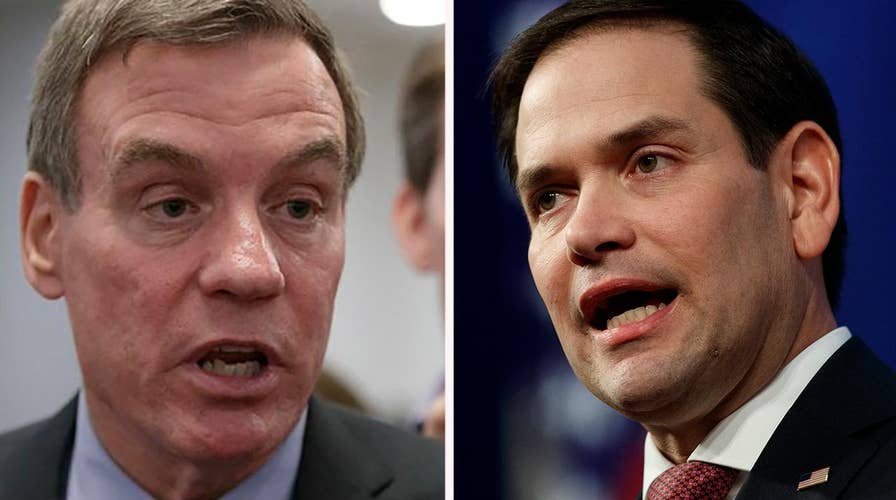Lawmakers propose legislation to protect American secrets from Chiina.
Sens. Warner, Rubio want to create a White House Office of Technology to review deals with China; William La Jeunesse has the details.
Trump administration officials are abandoning their threat to raise tariffs to 25 percent on $200 billion of Chinese goods. Many people are now expecting that a new trade deal between U.S. and China is imminent.
While the Chinese tariff issue may be receding, a real sticking point between President Trump and Chinese President Xi Jinping will remain and fester: whether the Chinese are compromising U.S. national security. A clear example of those concerns surfaced this week.
A group of grass-roots conservative leaders led by Morton Blackwell of the Weyrich Group and Jenny Beth Martin of Tea Party Patriots has just sent a letter to Treasury Secretary Steve Mnuchin demanding an immediate security review of a joint venture between a Pittsburgh specialty steel maker and a Chinese firm that is the world’s largest stainless steel producer.
JOHN STOSSEL: MR. TRUMP, IF YOU RAISE TARIFFS ON STEEL AND ALUMINUM, YOU PUNISH CONSUMERS
Allegheny Technologies hopes to use the joint venture to import 336,000 metric tons of stainless steel slabs every year from an Indonesian mill owned by China’s Tsingshan Group. The slabs – which would be free of any tariffs – would then be turned into 60-inch-wide steel sheets. About 100 new jobs would be created at an Allegheny plant in Midland, Pennsylvania.
The conservative leaders say the joint venture between Allegheny and Tsingshan hasn’t yet been reviewed by the Committee on Foreign Investment in the United States (CFIUS).
“China’s history of stealthy intellectual property theft triggers immediate concerns,” they write. “ATI possesses sensitive intellectual property that China could seek to extract and transfer in order to undercut U.S. economic and military advantages.”
The conservative leaders point out that in 2014, hackers from the Chinese People’s Liberation Army were charged with cyber intrusions and economic espionage aimed at three U.S. steel producers, including Allegheny.
The concern over such espionage is heightened because Allegheny has publicly testified that “virtually every major military aerospace system contains an ATI specialty steel or alloy.” The concern is that the Chinese could gain access to sensitive information through the back door of a joint venture that they couldn’t obtain through hacking.
For its part, Allegheny says such worries are overblown. Executive Vice President Robert Wetherbee told the Pittsburgh Tribune-Review that the Chinese will not have access to cutting-edge technology because of the joint venture.
Indeed, Wetherbee contends that the project will be “a plus to national security, not a negative” because it will strengthen Allegheny’s long-term financial viability as a supplier to the U.S. defense industry. Wetherbee says the firm has provided U.S. officials with all of the information on the proposed joint venture and is willing to cooperate with any investigation.
Supporters of free trade make a good case that too often objections to trade deals involve little more than special-interest pleading or sketchy national security claims. But I suspect the Allegheny deal will ring alarm bells in the Trump administration for a couple of specific reasons.
One is the clear record of Tsingshan’s involvement with the Chinese military establishment. Indeed, the firm helped produce China’s first aircraft carrier.
“There is no such thing as an independent Chinese producer of strategic materials,” says Gordon Chang, an expert on the Chinese economy. “They all cooperate or are in bed with the Communist government.”
Second, Allegheny’s competitors have a case that the firm has other options than trying to circumvent tariffs by importing steel slabs from Tsingshan’s Indonesian plants. North American Stainless, a producer of stainless steel in Kentucky, says that Allegheny closed a Midland, Pennsylvania steel making plant in 2015 that could have produced the slabs the company now wants to import tariff-free.
North American Stainless accuses Allegheny of “consciously deciding to abandon its melt shop workers and refusing to invest in reopening its facilities” and “supporting Chinese-controlled foreign slab production.”
Allegheny responds that reopening the Midland facility isn’t viable because it would cost as much as $75 million and take three to five years.
CLICK HERE TO GET THE FOX NEWS APP
Whether that’s true or not, the political and geopolitical situation has changed since Allegheny shut down the Midland plant in 2015. Donald Trump won Pennsylvania and the presidency in 2016 in part because of blue-collar anger at U.S. companies closing down domestic plants and relying on greater foreign imports.
That may have made economic sense at the time, but the new “trade winds” coming from the Trump White House make it clear decision like Allegheny’s will now go under a regulatory microscope.

